“One minute we were young innocent children of eight years of age who were looking forward to the holidays and then at twenty past nine we were totally different people and would never be the same again.”
Jeff Edwards
The last child to be lifted out of Pantglas School alive.
============================
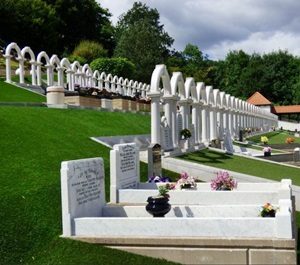
The Aberfan Memorial
This is what happens when no one listens.
============================
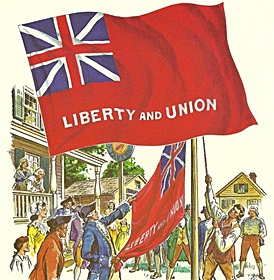
1774 – The flag of Taunton, Massachusetts became the first to include the word “Liberty”.
The visual design of the Taunton Flag, also called the Liberty and Union flag, was in itself not unique.
But the words “liberty and union” inscribed below the Queen Anne-style geometric display of red, white and blue stripes were to become symbolic of the rebellion and defiance of the 13 colonies against the British.
It was also the first flag among the colonies to be displayed as a representation of dissension and revolt against the Crown, two years before the outbreak of the Revolutionary War.
1797 – The USS Constitution, a 44-gun U.S. Navy frigate built to fight Barbary pirates off the coast of Tripoli, was launched in Boston Harbor.
The vessel performed during the Barbary conflicts, and in 1805, a peace treaty with Tripoli was signed on its deck.
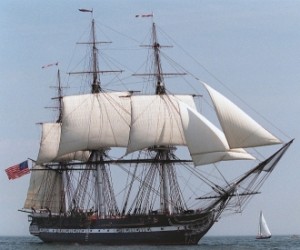
During the War of 1812, the Constitution won its enduring nickname “Old Ironsides” after defeating the British warship Guerriére in a furious engagement off the coast of Nova Scotia.
Witnesses claimed that the British shots merely bounced off the Constitution’s sides, as if the ship were made of iron rather than wood.
The success of ship against the supposedly invincible Royal Navy provided a tremendous morale boost for the young American republic.
Since 1934, it has been based at the Charlestown Navy Yard in Boston. Over the years, “Old Ironsides” has enjoyed a number of restorations, the most recent of which was completed in 1997, allowing it to sail for the first time in 116 years.
Today, the Constitution is one of the world’s oldest commissioned warships afloat.
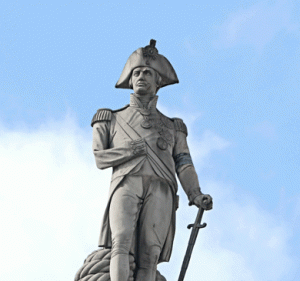
1805 – In one of the most decisive naval battles in history, a British fleet under Admiral Lord Nelson defeated a combined French and Spanish fleet at the Battle of Trafalgar, fought off the coast of Spain.
Nelson divided his 27 ships into two divisions and signaled a famous message from the flagship Victory:
“England expects that every man will do his duty.”
In five hours of fighting, the British devastated the enemy fleet, destroying 19 ships. No British ships were lost, but 1,500 British seamen were killed or wounded in the heavy fighting.
The battle raged at its fiercest around the Victory, and a French sniper shot Nelson in the shoulder and chest. The admiral was taken below and died about 30 minutes before the end of the battle.
Nelson’s last words, after being informed that victory was imminent, were “Now I am satisfied. Thank God I have done my duty.”
Victory at the Battle of Trafalgar ensured that Napoleon would never invade Britain. Nelson, hailed as the savior of his nation, was given a magnificent funeral in St. Paul’s Cathedral in London.
A column was erected to his memory in the newly named Trafalgar Square, and numerous streets were renamed in his honor.
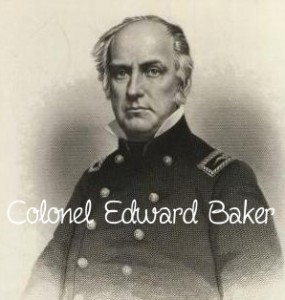
1861 – At the Battle of Ball’s Bluff in Virginia, Union forces under Colonel Edward Baker were defeated by Confederate troops in the second major battle of the Civil War.
Baker, a close friend of President Abraham Lincoln, was killed in the fighting.
He had placed his men in a dangerous position; a clearing with their backs to a 100-foot high cliff above the Potomac. When the Confederates attacked, many of Baker’s men jumped from the bluff to their deaths or scrambled down a narrow trail only to find their boats swamped in the river.
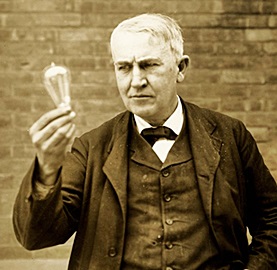
1879 – Thomas Edison invented a workable electric light at his laboratory in Menlo Park, N.J.
Edison wasn’t the first to create an alternative to gaslight. Electric lights already existed on a streetlight scale when, on this day, Edison tested the one he’s famous for.
Though he didn’t come up with the whole concept, his light bulb was the first that proved practical, and affordable, for home illumination.
The trick had been choosing a filament that would be durable but inexpensive, and the team at Edison’s “invention factory” in Menlo Park tested more than 6,000 possible materials before finding one that fit the bill:
A thin strip – or filament – of carbon.
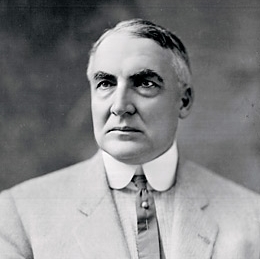
1921 – President Warren G. Harding delivered a speech in Alabama in which he condemned lynchings – illegal hangings committed primarily by white supremacists against African Americans in the Deep South.
During the 1920 presidential campaign, Harding’s ethnicity was a subject of debate and was used by his opponents to cast him in a negative light. Opponents claimed that one of Harding’s great-great-grandfathers was a native of the West Indies. Harding rebuffed the rumors, saying he was from white “pioneer stock” and persisted in his support of anti-lynching laws.
Although his administration was much maligned – and deservedly so – for scandal and corruption, Harding was a progressive Republican politician who advocated full civil rights for African Americans and suffrage for women.
He supported the Dyer Anti-lynching Bill in 1920. That bill made it through the House of Representatives, but died in the Senate. Several other attempts to pass similar laws in the first half of the 20th century failed.
In fact, civil rights for blacks were not encoded into law until Lyndon Johnson signed the Civil Rights Act in 1964.
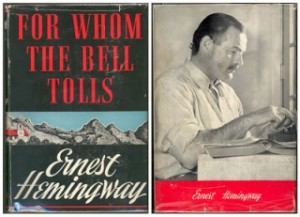
1940 – The first edition of the Ernest Hemingway novel For Whom the Bell Tolls was published.
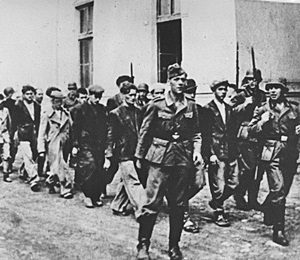
1941 – German soldiers went on a rampage, killing thousands of Yugoslavian civilians, including whole classes of schoolboys.
In Kragujevac (shown above), 2,300 men and boys were murdered.
The German High Command issued a statement, explaining the reason for the “discipline”.
“The cowardly and treacherous surprise attacks on German soldiers during the previous week, on which occasion 10 German soldiers were killed and 26 wounded, had to be punished. For that reason 100 people were shot for each killed German soldier, and for each wounded, 50, mainly communists, bandits and their siders, 2300 altogether. Every similar case, even if it were only sabotage, will be dealt with the same severity.“

1958 – Buddy Holly made his final studio recordings at Pythian Temple Recording Studios in New York City.
He recorded True Love Ways, Raining In My Heart, Moondreams, and It Doesn’t Matter Anymore.
It Doesn’t Matter Anymore and Raining In My Heart were released as a single one month before Holly’s death.
True Love Ways was released posthumously in 1960 with Moondreams as the B-Side .

1964 – The film version of My Fair Lady, directed by George Cukor and starring Rex Harrison and Audrey Hepburn premiered in New York City.
A critical and commercial success, it won eight Academy Awards, including Best Picture, Best Actor, and Best Director.
Hepburn’s singing was judged inadequate, and she was dubbed by Marni Nixon, who sang all songs except Just You Wait.
Rex Factoid: Harrison – who could be quite difficult to work with when the mood struck him – refused to pre-record his musical numbers for the film, explaining that he had never talked his way through the songs the same way twice when he played the role of Henry Higgins on Broadway and thus could not convincingly lip-sync to a playback during filming.
George Groves, the film’s Director of Sound, decided to use a wireless microphone to capture Harrison singing live.
It was the first such use of a wireless microphone during filming of a motion picture. The sound department earned an Academy Award for its efforts.

1965 – The Beatles recorded Norwegian Wood (This Bird Has Flown), one of the first pop songs to feature the sitar, an Indian instrument played by George Harrison.
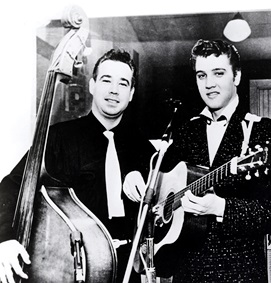
1965 – Bill Black, the bassist in Elvis Presley’s early trio, died from a brain tumor at the age of 39.
Black and guitarist Scotty Moore backed Presley on several of his early hits; Good Rockin’ Tonight, Heartbreak Hotel, Baby Let’s Play House, Mystery Train, That’s All Right, Hound Dog and Jailhouse Rock before leaving in 1957 because of poor wages.
Black then formed Bill Black’s Combo and had hits with Smokie, Part 2, White Silver Sands, and Blue Tango.
Presley was heavily criticized for not attending the funeral, but he believed that his presence would turn into a media frenzy. He decided instead to visit the family privately after the service to express his condolences.
Bass Factoid: Black’s main stand-up bass is now owned by Paul McCartney.
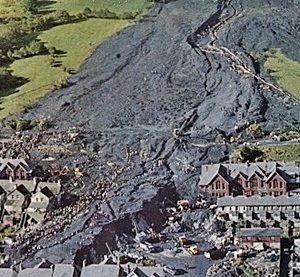
1966 – An avalanche of mud and rocks buried a school in Wales, killing 116 children and 28 adults.
Background: Merthyr Vale was one of the largest of more than 600 coal mines which plundered the once picturesque green valleys for “black gold”.
At the Merthyr Vale mine, 36 tons a day of ash, coal waste and sludge were produced. This was piled up in what is known as a tip.
Numerous complaints had been made to the National Coal Board about the dangers of one of the seven gigantic slag heaps that loomed a quarter of a mile high above the village of Aberfan – including a petition from Pantglas Junior School in 1963.
The NCB brushed complaints aside.
The tips were notorious for sliding but there was particular concern about Aberfan’s “tip number seven” which had begun in 1958 and had risen to a 700-foot heap of 300,000 cubic yards of waste.
It laid on highly-porous sandstone with streams and underwater springs.
Down a large hill from the tip sat the small village and the brick Pantglas School. In the days leading up to October 21, there was heavy rain in the area. Some mine workers noticed cracks in the tip, but nothing was done to investigate further.
That morning had dawned dark and damp; the area was covered by a thick fog. A bulge had formed at the foot of the tip as mountain spring water, unable to drain away, liquefied the spoil into thick, black quicksand.
At 07:30 a.m., the tip was reported to have sunk 20 feet.
One mine worker told a subsequent inquiry how the slide began.
“It was starting to come back up. It started to rise slowly at first … I thought I was seeing things. Then it rose up pretty fast, at a tremendous speed. Then it sort of came up out of the depression and turned itself into a wave… down towards Aberfan village… into the mist.”
At around 9:15 a.m., mine workers heard a loud noise and through the fog saw that the immense tip had disappeared.
It had crashed down the hillside onto a farm, the school and eight homes.
Down at Pantglas Junior School, the lights began to flicker and sway. There was an ominous roar like “a jet plane screaming low over the school in the fog.”
The glistening black avalanche consumed rocks, trees, farm cottages, then ruptured the water main, engorging it further and increasing the velocity of its murderous 50-mph descent towards Pantglas.
Thick black dust enveloped the entire village. The muddy sludge was 45 feet deep outside the school and much of the school itself was buried.
Seconds after it hit, Cyril Vaughan, a teacher at the neighboring senior school, said “everything was so quiet. As if nature had realized that a tremendous mistake had been made and nature was speechless.”
The body of the deputy head teacher was found with the bodies of five children in his arms.
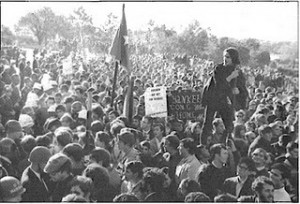
1967 – In Washington, D.C. nearly 100,000 people gathered to protest the American war effort in Vietnam.
More than 50,000 of the protesters marched to the Pentagon to demand an end to the conflict. The protest was the most dramatic sign of waning U.S. support for President Lyndon Johnson’s war in Vietnam.
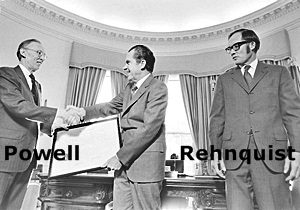
1971 – President Richard M. Nixon nominated Lewis F. Powell and William H. Rehnquist to the U.S. Supreme Court.
The Senate confirmed Powell by a vote of 89-1 on December 6 and Rehnquist’s nomination passed by a vote of 68-26 on December 7.
Powell and Rehnquist (who would become the Chief Justice in 1986) were sworn in on January 7, 1972.

1975 – Boston Red Sox catcher Carlton Fisk hit a ball that struck the left field foul pole in Boston’s Fenway Park for a home run, giving the Red Sox a 7-6 victory in 12 innings over the Cincinnati Reds in Game 6 of the World Series.
The Sox went on to lose Game 7, but still, even 44 years later, the photo of Fisk urgently trying to wave the ball into fair territory provides one of the game’s most enduring images.
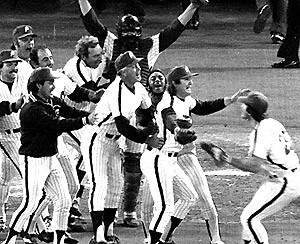
1980 – The Philadelphia Phillies finally won a World Series – 97 years after the club’s establishment.
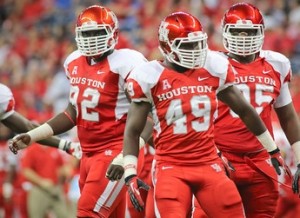
1989 – The University of Houston became the first major college football team to gain over 1,000 yards in a game.
In their 95-21 shellacking of Southern Methodist University, the Cougars had 771 passing yards – Houston quarterback Andre Ware threw for 517 yards and six touchdowns in the first half – and another 250 on the ground.
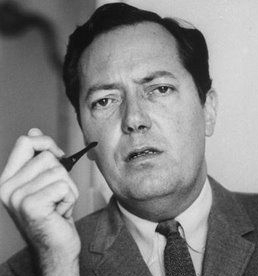
1992 – Jim Garrison, former District Attorney of Orleans Parish, Louisiana, best known for his investigations into the assassination of President John F. Kennedy, died of cancer at the age of 70.
The end result of Garrison’s investigation was the arrest and trial of New Orleans businessman Clay Shaw in 1969. Shaw was acquitted less than one hour after the case went to the jury.
Garrison later wrote three books on the Kennedy assassination, A Heritage Of Stone, which placed responsibility for the assassination on the CIA and claimed the Warren Commission, the Executive Branch, members of the Dallas Police Department, the pathologists at Bethesda, and various others lied to the American public; The Star Spangled Contract,a fiction but based on the JFK assassination, and his best-seller, On The Trail Of The Assassins, which detailed his role in indicting Shaw.
On The Trail Of The Assassins was partially adapted by Oliver Stone for the 1991 film JFK, starring Kevin Costner as Garrison.

1995 – Shannon Hoon, led singer with Blind Melon (No Rain) died from a cocaine overdose. He was 28.

2003 – Invoking a hastily-passed law, Florida Gov. Jeb Bush ordered a feeding tube reinserted into Terri Schiavo, a brain-damaged woman at the center of a bitter right-to-die battle.
Michael Schiavo, Terri’s husband, had won court approval to remove a feeding tube that had provided sustenance for years following the collapse that left her in what doctors called a “persistent vegetative state.”
He was opposed by Bob and Mary Schindler, her parents, who argued that she was conscious.
Bush pushed the Florida legislature to fast-track Terri’s Law, which gave him the authority to overrule the court and issue a stay.
The bill was declared unconstitutional in 2004.
After a lengthy series of appeals were rejected, he tube was again removed on March 18, 2005.
Terri passed away 13 days later.
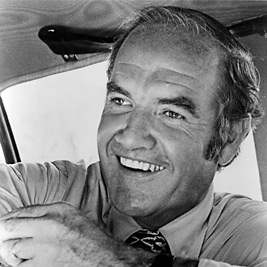
2012 – George McGovern, former U.S. Congressman and U.S. Senator from South Dakota, died of natural causes at the age of 90.
McGovern was the Democratic nominee for president in 1972 but lost to Richard Nixon in an electoral landslide, 520-17.
Compiled by Ray Lemire ©2019 RayLemire.com / Streamingoldies.com. All Rights Reserved.
We’re listening…and learning! The Aberfan tragedy is so heartbreaking and could’ve been prevented! I remember seeing Carlton Fisk fairly up close and I know you do too! I’ve always been fascinated with light bulbs and circuits in general. So many take aways, as usual! Always great variety, always an informative lesson!
Thanks, Wendyl ❤
The story of Aberfan broke my heart 🙁
But yes, I do remember seeing Carlton (and I remember how much you liked him). 🙂
Wow never had heard about the coal tip disaster…learn something new every day and often here. Thank you
Thank you, Mary Helen.
Aberfan was a heartbreaking disaster and it never should have happened.
Many interesting things today. Whenever I read about Nazi atrocities, I wonder how human beings can be so cruel-just sickening. The Aberfan story was just so sad. Carlton Fiske was always a favorite(being from just across the river). Almost a “home boy” made good.
Thank you, Pat. One of the most difficult things I have ever worked on was the Aberfan disaster. It just broke my heart.